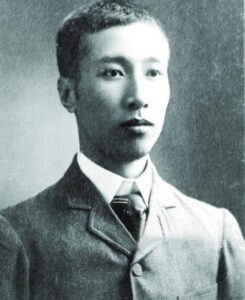Liu Shih-p'ei m ^ip m T. Shen-shu f^ u H. Tso-an '& M. Liu Shih-p'ei (2 May 1884-20 December 1919), classical scholar and enthusiastic republican revolutionary who, however, spent the last two years of the imperial period in the service of the Manchu authorities. After the 1911 revolution Liu devoted himself to the preservation of conservative scholarship and political institutions. In three generations before him, Liu Shihp'ei's family had produced four noted scholars of the Chinese classics: his great-grandfather, Liu Wen-ch'i (ECCP, I, 534-35) ; his grandfather, Liu Yü-sung (ECCP, I, 535-36); his father, Liu Kuei-tseng; and his uncle, Liu Shou-tseng (ECCP, I, 536). Although their ancestral home was in the Icheng district of Kiangsu, the family had lived in the city of Yangchow for several generations.
After receiving a traditional education in the Chinese classics, Liu Shih-p'ei became a shengyuan in 1901 and a chü-jen in 1902. He failed the metropolitan examinations at Peking in 1903 and went to Shanghai, where he met and became friendly with such young anti-Manchu revolutionaries as Chang Ping-lin and Ts'ai Yuan-p'ei (qq.v.). Liu joined them in their political activities and wrote articles advocating the overthrow of the Manchus. To show his revolutionary zeal, he changed his name to "Kuang-han"" [restore China] to identify himself with the restoration of ethnic Chinese rule in opposition to the Ivlanchus. Among his writings, the most representative of this period is the Jang-shu [on the expulsion], a title which in itself implies the driving out of the Manchus. In Shanghai, Liu also took part in establishing a monthly magazine, the Kuo-ts'ui hsueh-pao, and a school, the Kuo-ts'ui hsueh-t'ang. Both were devoted to the preservation of China's cultural heritage and were ardently nationalistic. In addition, Liu served as the editor of Ts'ai Yuan-p'ei's 0-shih ching-wen [Russian menace warning bulletin], soon renamed the Ching-chung jih-pao [alarm bell daily bulletin] . He hoped to make his compatriots aware of the 1904 Russian advance into Manchuria. When the paper was closed by the imperial authorities in April 1905 because of its anti-Manchu stand, Liu escaped arrest by taking refuge in P'inghu, Chekiang. He then became a teacher in a middle school in Wuhu, Anhwei, where in 1906 he established the Pai-hua pao [vernacular paper] .
After Chang Ping-lin became the editor of the republican Min-pao [people's journal] in Tokyo, he invited Liu Shih-p'ei to join his staff. Liu went to Japan in 1907, joined the Min-pao staff, and became a member of the T'ung-meng-hui, which had been organized by Sun Yat-sen in 1905. After being befriended and influenced by some of the more radical Japanese socialists, Liu began publishing the T'ien-i pao [natural law journal], which was one of the earliest Chinese periodicals devoted to socialism, and joined with Chang Chi (q.v.) in forming a club to study socialism. Another journal published by Liu Shih-p'ei in Tokyo during this period was the Heng-pao [journal of discussion]. In addition to his interest in socialism, Liu's writings in Japan also indicate that he was attracted to anarchism.
In 1909 Liu Shih-p'ei suddenly changed his attitude toward the revolutionary movement, broke With his colleagues in Japan, and returned to China, where he joined the secretariat of Tuan-fang (ECCP, II, 780-82), then the Manchu viceroy of Liang-Kiang. The reasons for this abrupt change are not clear, but whatever the explanation, Liu spent the last two years of the imperial period in the service of the Manchu authorities.
After the Manchu government announced its plan to nationalize certain railways in 1911, Tuan-fang, who had become superintendent of the proposed Canton-Hankow-Chengtu railway, was ordered to Szechwan to suppress opposition to the program. The revolution broke out while Tuan-fang was on his way to Chengtu, and he was killed in November 1911. Liu Shih-p'ei, who had accompanied Tuan-fang on the trip, escaped to Chengtu, where he taught at the Szechwan Kuo-hsueh hsuehhsiao [school for Chinese studies] and contributed to the Szechwan Kuo-hsueh tsa-chih [Chinese studies magazine], a journal issued by the school.
In 1913 Liu moved to Taiyuan, Shansi, where he started another journal of Chinese studies, the Kuo-ku kou-ch'en [from out of China's past]. He went to Peking in 1914, and he was appointed to the National Assembly by Yuan Shih-k'ai in 1915. Liu became one of the six original members (known collectively as the liu chün-tzu, or Six Gentlemen) of the Ch'ouan-hui [society to plan for stability], who officially launched a movement to make Yuan Shih-k'ai monarch. Liu's chief contribution to the effort was his essay "Chün-cheng fu-ku lun" [on restoration of the monarchy] . After Yuan's death in 1916, Liu retired to Tientsin. At the invitation of Ts'ai Yuan-p'ei, then the chancellor of National Peking University, he joined the faculty of that institution in 1917 and remained there until his death from tuberculosis at the end of 1919. During his last years in Peking he wrote for the Chung-kuo hsueh-pao [China academic journal] and the Kuo-ku tsachih [national heritage magazine]. After Liu Shih-p'ei's death, at the age of 35, his friends and pupils collected and published seventy-four of his writings in seven volumes as the Liu Shen-shu hsien-sheng i-shu in 1936. This collection included studies of the Chinese classics, essays, poems, study notes, and textbooks on various subjects. The study notes included the "Tun-huang hsin-ch'u - T'ang hsieh-pen t'i-yao," descriptive notes on 19 items of the T'ang manuscripts taken by Paul Pelliot from Tunhuang. Although Liu was acclaimed as a scholar, particularly of the Ch/un-ch'iu tso-chuan [Tso's commentary on the Spring and Autumn Annals], many of his writings lacked profundity and critical insight. As a prolific writer who communicated his opinions on a variety of subjects in periodicals established by himself or others, Liu Shih-p'ei helped pave the way for modern Chinese journalism.

刘师培
字:申叔
号:左盦
刘师培(1884.5.2—1919.12.20),研究古文典籍的学者和热诚的共和革命党人。清代最后两年中,他曾在清廷任职,1911年革命后,致力于保存旧学术和旧的政治制度。
刘师培一家三代出了四个着名学者,高祖刘文洪,祖父刘镇崧、父亲刘贵曾、伯父刘寿曾,他们的祖籍是江苏仪徴,但已在扬州住了好几代。
刘师培习读中国古籍后成秀才,1902年中举人,1903年殿试落第后去上海遇见年青的反清革命党人章炳麟、蔡元培,刘参加了他们的政治活动,撰文反清,他改名“光汉”以示其推翻满族恢复汉族统治的革命热忱,《攘书》是最能代表他这时期思想的文章,该文的名称就是暗示推翻满清的,他在上海还与人合力创办月刊《国粹学报》,筹办国粹学堂,二者都是出于民族主义思想致力于保存中国传统文化,此外又担任蔡元培主办的《俄事警闻》编辑,该刊不久改名为《警钟日报》。他希望由此提醒国人注意俄国1904年入侵东北之举。由于该刊持反清立场,1905年4月被清廷査封。刘逃避到浙江平湖,后又在安徽芜湖的一所中学教书,1906年他在该地创办《白话报》。
章炳麟在东京主编《民报》后,邀刘师培前去参加,刘于1907年到日本参与共事,同时加入了同盟会,这个组织是孙逸仙于1905年建立的。他与日本的一些更激进的社会主义者结识为友后,又创了一份中国最早谈论社会主义的期刊《天义报》,又与张继合办了一个研究社会主义的团体。刘师培在东京创办的另一份报纸是《衡报》。他在日本的作品,除了反映出她对社会主义的兴趣外,还表明他倾向于无政府主义。
1909年,刘师培忽然改变了他对民党革命的态度,与在日本的同道决裂回到中国,入两江总督端方幕府。这次突变,原因不详,但无论如何他终于在帝制时期的最后两年中,为满清当局效了力。
1911年,清政府宣布将某些铁道收归国有,京汉四川铁路督办端方去四川镇压反对铁路国有的运动。1911年革命爆发时端方正在去成都途中,11月被杀,陪阖端方的刘师培逃往成都,在四川国学学校教书,并为该校出版的《国学杂志》撰稿。
1913年,刘师培到山西太原,办了另一份杂志《国故钩沉》,1914年去北京,1915年袁世凯叫他当议员,成了筹安会六君子之一,拥戴袁世凯称帝。1916年袁死后,刘退居在天津,后由北京大学校长蔡元培之请,1917年到北大教书直至1919年因肺病死去。他在北京的最后几年中,为《中国学报》、《国粹杂志》撰稿。
刘师培于三十五岁时死去后,他的朋友和学生编选出版了他的七十四篇文章,分七册于1936年出版,书名《刘申叔先生遗书》,这套书收集了他有关中国经史的研究文章、论文、诗词、笔记,以及一些教材。研究笔记中有《敦煌新出唐写本提要》,是关于由伯希和从敦煌所得十九篇稿本的详细注释。
刘师培虽被人们称为学者,尤其是关于《左氏春秋》的研究者,但他的不少著述峡乏深度和创见。作为一名多产的作家,他在自己办的以及和别人合办的刊物上对各种题目发表了他的见解,这也为开辟中国现代新闻事业的道路出了力。